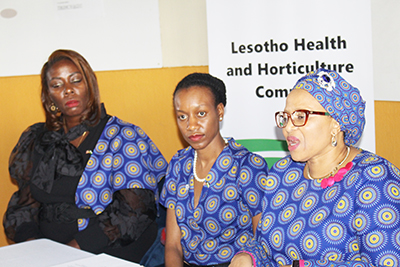By: Thoboloko Ntšonyane
MASERU – The Minister of Finance and Development Planning Dr Retšelisitsoe Matlanyane says the Millennium Challenge Corporation (MCC) Compact II is a beacon of hope to the country’s ailing economy.
Although the celebrations were held last week, MCC Deputy Chief Executive Officer (CEO) Chidi Blyden says Compact’s clock started ticking on March 31st.
During the celebration hosted by the government of Lesotho and the United States at Thaba-Bosiu last week.
Lesotho will see an injection of a $300 million grant from MCC Compact II. That grant will be matched by $22.5 million from the government, bringing it to a total of $322.5 million, just over M6 billion.
During the five year implementation period of this Compact, the government reports more than 90 000 direct and indirect jobs in expectation.
Meanwhile, MCC Compact II builds on the success of the2008 – 2013 Compact I programme through which the country saw an investment of $362 million. The Compact I investment reflects itself in the improvement of water supply, increased access to essential health services, and debottleneck of barriers to private sector investment.
The Compact’s over M6 billion targets 3 (three) areas:
- Health Systems Strengthening (HSS) Project,
- Market-Driven Irrigated Horticulture (MDIH) Project and,
- Business Environment and Technical Assistance (BETA) Project.
Health Systems Strengthening (HSS) Project
The project aims to improve the delivery of health services and management of primary health care in the country.
Approximately M1.4 billion will be invested to enhance health services. These include gender based violence (GBV) services and response, Lesotho’s healthcare management units’capacity, confidentiality, analysis and usability.
Market-Driven Irrigated Horticulture (MDIH) Project
M2.2 billion investment aimed at improving this sector. The focus is on increasing rural income related to commercial agriculture. This includes women, youth and the rural poor population; and the establishment of sustainable and inclusive model of irrigation, water resources, and land management.
This project shall provide extensive technical assistance and investments in institutional reforms and capacity building of both the government and beneficiaries of the project’s investment in irrigation infrastructure so as to develop a successful and sustainable horticulture industry.
About 1 500 hectors of land will be irrigated for the formation and maintenance of orchards and farms.
Business Environment and Technical Assistance (BETA) Project
Principal beneficiaries for this project are youth, women and businesses in rural areas. The project’s focus is largely supporting an increase in profits and formal employment of upcoming businesses, including micro, small, and medium enterprises (MSMEs).
There will also be grants available for opportunities to be explored by women and youth entrepreneurs.
Improvements in this sector will receive a M1.1 billion investment.
The Compact’s Sesotho name, “Leboela la Seapa-mere” means he who returns to dig up more medical plants to heal the ailing economy.
These investments are intended to support the building of infrastructures, systems and improved framework and policies.
“The compact is investing in the economic potential of the Basotho people- families, women, youth – your children and grandchildren and future generations to come. Each project was designed to fulfil our shared goal to reduce poverty through economic growth,” says Dr Matlanyane.
There is intentional focus on gender equality and inclusion is so that marginalised groups have equal opportunities.
MCC CEO congratulates Lesotho on “this historic milestone” for securing the Compact II, as Lesotho has been a long-standing partner of MCC.
Blyden says the MCC and the government of Lesotho will partner to spur development and financing of business – particularly for women and youth; invest in irrigation and agricultural production in Lesotho, to improve climate resilience especially for local farmers.
“Ultimately, each of these investments will address unique challenges to create greater prosperity for the people of Lesotho,” she says.
Prime Minister Rt Hon Ntsokoane Matekane commits the government’s resolve to making this investment a success.
MMC Compact II’s implementation follows the enactment of three bills by Parliament namely:
- Administration of Estates and Inheritance Bill, 2024,
- Occupational Safety and Health Bill, 2024 and
- Labour Bill, 2024.
The Administration of Estates and Inheritance Bill, 2024 was passed by the National Assembly despite it being rejected wholly by the Senate. The Upper House argued that consultations were not being made ahead of formulating this piece of legislation. They also had reservations in that this law revokes the customary laws of Basotho, which are administered through the Laws of Lerotholi.


